It doesn’t take more than a brief scan of the news to see the devastating impact of coronavirus (COVID-19). With the infection of over 83,000 people spread across the globe, the fallout that the virus can and will take on human life is paramount. But beyond the toll this has taken on public health and safety, businesses around the world are also wrestling with how susceptible they have become to any potential volatility.
For publicly traded companies, this has forced a new level of diligence, prompted by an alert from the Securities and Exchange Commission. In a Jan. 30
Though Clayton acknowledged the uncertainty involved in assessing these effects, he emphasized that “how issuers plan for that uncertainty and how they choose to respond to events as they unfold can nevertheless be material to an investment decision.”

Chairman Clayton revisited this matter in another
So in light of this new global challenge, what do these businesses and their tax professionals need to consider?
Questions to ponder
There are eight main areas for public companies to take stock of that are related to supply-and-demand challenges, the market, people, and products and services. Public registrants should ask themselves if (1) they are experiencing or anticipating any changes in demand from China-based customers or for products made in China; (2) they are making alternative arrangements to purchase goods from sources outside of impacted areas and the costs of doing so; (3) they are encountering or anticipating issues with the flow of goods to and from China because of travel restrictions; (4) they are closing stores and/or offices; (5) they are faced with product shortages or with staffing shortages because of quarantines in China; (6) their investment in Chinese stocks or other investments is too large and may require impairment; (7) they are exposed to volatility in commodities markets impacted by the coronavirus; and (8) they are exposed to foreign currency volatility.
Measures to take
As companies consider the above and other disclosure considerations related to their coronavirus risks, there are also preventative measures they can take to help ensure future compliance:
Periodic filings: Companies should craft tailored disclosures in their Exchange Act periodic reports discussing risks posed to their business and operations, particularly in sections covering risk factors, management’s discussion and analysis (MD&A), description of business, and market risk.
Other filings: Companies should also craft these tailored coronavirus-related disclosures in their Exchange Act current reports, earnings releases, Exchange Act and Securities Act registration statements, and Form 424 prospectuses.
Subsequent events: Management should scrutinize events occurring after a reporting period, but before financial statements are issued, and determine whether they are to be disclosed in financial statement notes or recognized in the financial statements. Note disclosures are sufficient if the event provides new information about conditions that did not exist as of the end of the reporting period (e.g., changes in asset value due to changes in exchange rates). However, events that provide additional information about conditions that did exist as of the end of the reporting period call for financial-statement adjustment (e.g., bad-debt situation where company issues invoices to a customer in financial difficulty before end of reporting period, and customer files for bankruptcy as a subsequent event).
Internal control over financial reporting (ICFR): Management should also consider whether the coronavirus outbreak has prompted them to upgrade their business response plan, implementing new controls in the process (e.g., allowing remote work and education). This is considered material and should be disclosed.
Information access: Companies should carefully evaluate their ability to obtain and provide financial statements and information because failure to do so could negatively impact audit quality. If, for example, an entity has significant operations in China, certain of its key people may be unavailable to provide information. This could result in delays in receiving financial data related to acquired businesses or guarantors for consolidated financial statements.
Delayed filings: If a registrant anticipates filing delays due to the coronavirus outbreak, there is no need to be a delinquent filer. Instead, contact the SEC staff and/or file a Notification of Late Filing on Form 12b-25.
Navigating the uncertainty
The coronavirus outbreak is evolving, so registrants are urged to keep an eye out for guidance published by the SEC. It will be imperative that management not just evaluate and prepare to report on the business impact of their own coronavirus risks, but also work with the audit committees and auditors to help ensure reliable, high-quality financial reporting and auditing processes. The path ahead may be uncertain, but a company that is diligent can take steps to weather this tumultuous time.





